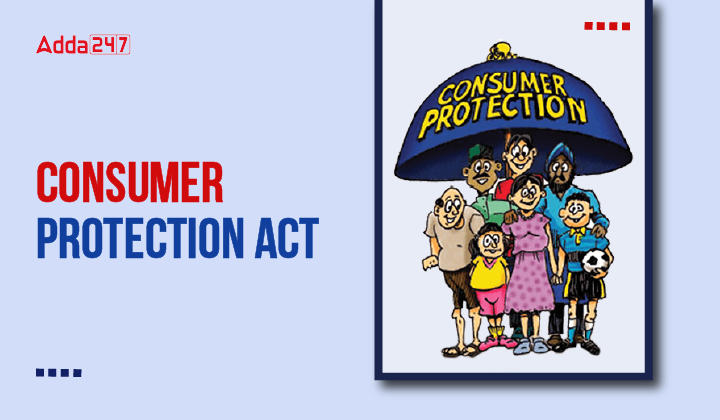Table of Contents
The Consumer Protection Act, 1986 is a legislative framework designed to safeguard the rights and interests of consumers in various transactions. It aims to ensure fair practices, prevent unfair trade practices, and provide an avenue for consumers to seek redressal for grievances. In this article, we will learn about the fundamentals of consumer protection, the Consumer Protection Act, its amendments and the responsibilities of consumers.
Consumer Protection Act 1986 Overview
The Consumer Protection Act, 1986 (COPRA) meets the essential social need to a very great extent. A vigilant consumer owes it to himself and his family members to know and understand the relevant provisions of this significant statute, which is a piece of socio-economic legislation. The act not only provides consumers protection against unscrupulous practices but also makes them self-aware of their rights.
Who is a Consumer?
The term consumer refers to any person, firm, Hindu undivided family, cooperative society or association that buys or hires (fully/partly paid for) goods or services for non-commercial purposes except self-employment.
According to the Consumer Protection Act, 1986, “Consumer” means any person who buys or hires any services for some consideration, paid or promised, and includes any other user of goods or services using them with the approval of the buyer. It does not, however, include a person who obtains goods for any commercial purpose or for resale.”
What is Consumer Protection?
Consumer protection refers to the steps necessary to be taken or measures required to be accepted to protect consumers from business malpractices. It may be regarded as a movement like consumerism. This is necessary primarily because businessmen aim at maximising profits and this is often done at the expense of consumers
Consumer Protection Act, 1986
The Consumer Protection Act, 1986 empowers consumers by providing a structured mechanism to voice grievances, seek redressal, and hold businesses accountable for any misconduct. By establishing dedicated consumer forums and regulatory bodies, the act not only offers protection but also promotes ethical conduct within the business landscape. It encourages fair trade practices and cultivates a culture of informed consumer decision-making, ultimately benefiting both consumers and the economy as a whole.
Rights of the Consumer under the Consumer Protection Act, 1986
The six rights of the consumer as enunciated under Section 6 of the COPRA are:
- The Right to Safety: The right to safety protects the consumer against the marketing of goods and services which are hazardous to life and property.
- The Right to Be Informed: The right to be informed states about the quality, quantity, potency, purity, standard and price of goods or services, as the case may be, so as to protect the consumer against unfair trade practices.
- The Right to Choose: This provides the customer with the right to make choices and access to a variety of goods and services at competitive prices.
- The Right to be Heard and to be assured: This right states that the customer’s voice and interest should receive due consideration at appropriate forums.
- The Right to Seek Redressal: This right protects customers against unfair trade practices or restrictive trade practices or unscrupulous exploitation of them.
- The Right to Consumer Education: This right to acquire the knowledge and skill to be an informed consumer throughout life.
Amendments to the Consumer Protection Act
The Consumer Protection Act, of 1986 was amended in the year 2019. Below are the major changes introduced in COPRA, 2019.
| Amendments to the Consumer Protection Act | ||
| Provisions | Consumer Protection Act, 1986 | Consumer Protection Act, 2019 |
| Regulator | No separate regulator | Central Consumer Protection Authority to be formed |
| Consumer Court | Complaints could be filed in a consumer court where the seller’s (defendant) office is located. | Complaints can be filed in a consumer court where the complainant resides or works |
| Product Liability | No Provision. Consumers could approach a civil court but not a consumer court. | Consumers can seek compensation for harm caused by a product or service. |
| Pecuniary Jurisdiction | District: up to Rs. 20 Lakh
State: Rs. 20 Lakh to Rs. 1 Cr. National: above Rs. 1 Cr. |
District: from Rs. 20 to Rs. 1 Cr.
State: Rs. 1 Cr. to Rs. 10 Cr. National: above Rs. 10 Cr. |
| E-Commerce | No Provision | All rules of direct selling extended to e-commerce. |
| Mediation cells | No legal provision | Court can refer to settlement through mediation |
Duties and Responsibilities of the Consumer
Consumer protection is not a one-way street. To enjoy protection, consumers have to exercise some responsibilities too. M. R. Pai of the Forum of Free-enterprise, Mumbai, in his booklet, has listed a few responsibilities that the consumers are expected to bear.
- Substantiate Complaints: When raising a complaint against a seller, ensure that the complaint is clear and supported by relevant evidence, such as receipts or correspondence. Vague complaints should be avoided, and your claims should be genuine.
- Seek Seller’s Viewpoint: Before taking your complaint to the appropriate authorities, consider seeking the seller’s side of the story. Sometimes, understanding the seller’s perspective might provide insights you hadn’t considered initially.
- Cooperate with Sellers: In situations where products or services are in short supply, be open to cooperating with the seller’s instructions, like waiting in a queue. Use legal action as a last resort. Additionally, supporting sellers in pressuring producers to replace defective items can be beneficial.
- Minimise Inconvenience: While asserting your rights, it’s important to ensure that your actions don’t cause unnecessary trouble for unrelated individuals. Actions like protests should be conducted in a way that doesn’t negatively impact the general public.
- Address Systemic Issues: When making complaints, direct your concerns towards the systemic issues at hand rather than blaming specific individuals. Focusing on improving processes will lead to more effective change.
- Avoid Manipulation: Guard against being manipulated for political purposes. While fighting for your consumer rights, maintain a focus on your personal concerns without allowing yourself to be used for political agendas.
- Informed Complaints: Before lodging a complaint, take the time to thoroughly understand the issues. Read and comprehend the terms and conditions of your purchases. Lack of awareness about crucial details might hinder your ability to exercise your rights.
- Grievance Redressal Knowledge: Familiarise yourself with the proper channels for addressing grievances. For minor issues, approach dealers or certifying authorities rather than resort to civil courts. This approach saves both time and resources.
- Thoughtful Purchases: Approach your purchases thoughtfully. Research products, explore different options, compare quality and prices, and avoid making impulsive decisions. While seeking advice is helpful, ultimately, make decisions independently based on your own judgment.
Conclusion
It is concluded that the Consumer Protection Act protects consumers against exploitation and subpar products. Recognizing the power imbalance between consumers and businesses, the act promotes transparency, accountability, and accessibility. Encouraging ethical practices, it not only shields consumers but also nurtures a competitive marketplace. Informed consumer decision-making benefits both individuals and the economy at large.




 UGC NET Notification 2025 Out, Exam Date...
UGC NET Notification 2025 Out, Exam Date...
 Last Minute Preparation Tips for MP TET ...
Last Minute Preparation Tips for MP TET ...
 GAT B Cut Off 2025, Check Expected, Cate...
GAT B Cut Off 2025, Check Expected, Cate...














